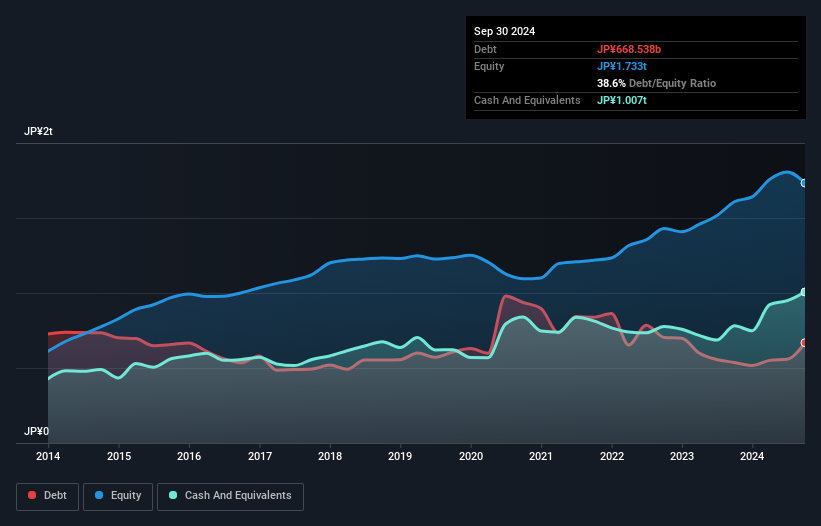Howard Marks put it nicely when he said that, rather than worrying about share price volatility, 'The possibility of permanent loss is the risk I worry about... and every practical investor I know worries about.' So it seems the smart money knows that debt - which is usually involved in bankruptcies - is a very important factor, when you assess how risky a company is. Importantly, Mazda Motor Corporation (TSE:7261) does carry debt. But is this debt a concern to shareholders?
Why Does Debt Bring Risk?
Debt assists a business until the business has trouble paying it off, either with new capital or with free cash flow. In the worst case scenario, a company can go bankrupt if it cannot pay its creditors. While that is not too common, we often do see indebted companies permanently diluting shareholders because lenders force them to raise capital at a distressed price. Of course, debt can be an important tool in businesses, particularly capital heavy businesses. When we think about a company's use of debt, we first look at cash and debt together.
See our latest analysis for Mazda Motor
What Is Mazda Motor's Net Debt?
You can click the graphic below for the historical numbers, but it shows that as of September 2024 Mazda Motor had JP¥668.5b of debt, an increase on JP¥536.7b, over one year. However, it does have JP¥1.01t in cash offsetting this, leading to net cash of JP¥338.4b.

A Look At Mazda Motor's Liabilities
According to the last reported balance sheet, Mazda Motor had liabilities of JP¥1.39t due within 12 months, and liabilities of JP¥735.4b due beyond 12 months. Offsetting these obligations, it had cash of JP¥1.01t as well as receivables valued at JP¥148.0b due within 12 months. So it has liabilities totalling JP¥969.2b more than its cash and near-term receivables, combined.
This deficit casts a shadow over the JP¥616.0b company, like a colossus towering over mere mortals. So we'd watch its balance sheet closely, without a doubt. After all, Mazda Motor would likely require a major re-capitalisation if it had to pay its creditors today. Given that Mazda Motor has more cash than debt, we're pretty confident it can handle its debt, despite the fact that it has a lot of liabilities in total.
The good news is that Mazda Motor has increased its EBIT by 3.5% over twelve months, which should ease any concerns about debt repayment. There's no doubt that we learn most about debt from the balance sheet. But ultimately the future profitability of the business will decide if Mazda Motor can strengthen its balance sheet over time. So if you're focused on the future you can check out this free report showing analyst profit forecasts.
Finally, a company can only pay off debt with cold hard cash, not accounting profits. While Mazda Motor has net cash on its balance sheet, it's still worth taking a look at its ability to convert earnings before interest and tax (EBIT) to free cash flow, to help us understand how quickly it is building (or eroding) that cash balance. Over the most recent three years, Mazda Motor recorded free cash flow worth 75% of its EBIT, which is around normal, given free cash flow excludes interest and tax. This free cash flow puts the company in a good position to pay down debt, when appropriate.
Summing Up
While Mazda Motor does have more liabilities than liquid assets, it also has net cash of JP¥338.4b. The cherry on top was that in converted 75% of that EBIT to free cash flow, bringing in JP¥194b. So we don't have any problem with Mazda Motor's use of debt. The balance sheet is clearly the area to focus on when you are analysing debt. However, not all investment risk resides within the balance sheet - far from it. For instance, we've identified 2 warning signs for Mazda Motor that you should be aware of.
When all is said and done, sometimes its easier to focus on companies that don't even need debt. Readers can access a list of growth stocks with zero net debt 100% free, right now.
New: Manage All Your Stock Portfolios in One Place
We've created the ultimate portfolio companion for stock investors, and it's free.
• Connect an unlimited number of Portfolios and see your total in one currency
• Be alerted to new Warning Signs or Risks via email or mobile
• Track the Fair Value of your stocks
Have feedback on this article? Concerned about the content? Get in touch with us directly. Alternatively, email editorial-team (at) simplywallst.com.
This article by Simply Wall St is general in nature. We provide commentary based on historical data and analyst forecasts only using an unbiased methodology and our articles are not intended to be financial advice. It does not constitute a recommendation to buy or sell any stock, and does not take account of your objectives, or your financial situation. We aim to bring you long-term focused analysis driven by fundamental data. Note that our analysis may not factor in the latest price-sensitive company announcements or qualitative material. Simply Wall St has no position in any stocks mentioned.
About TSE:7261
Mazda Motor
Engages in the manufacture and sale of passenger cars and commercial vehicles in Japan, North America, Europe, and internationally.
Flawless balance sheet with moderate growth potential.
Similar Companies
Market Insights
Community Narratives



